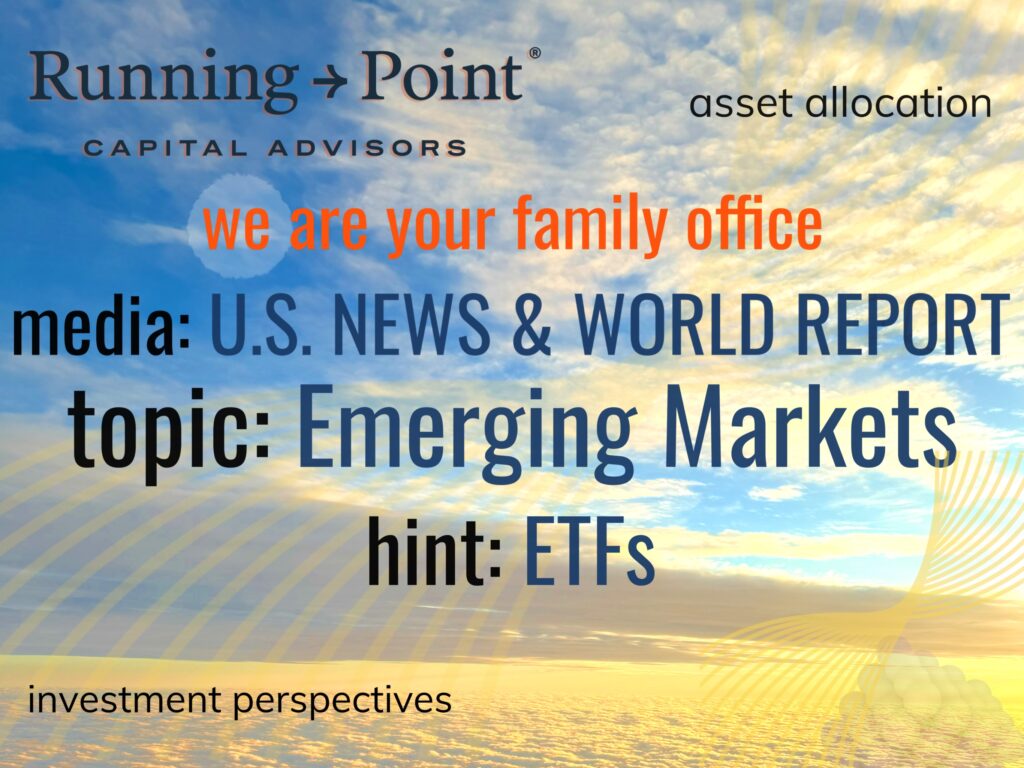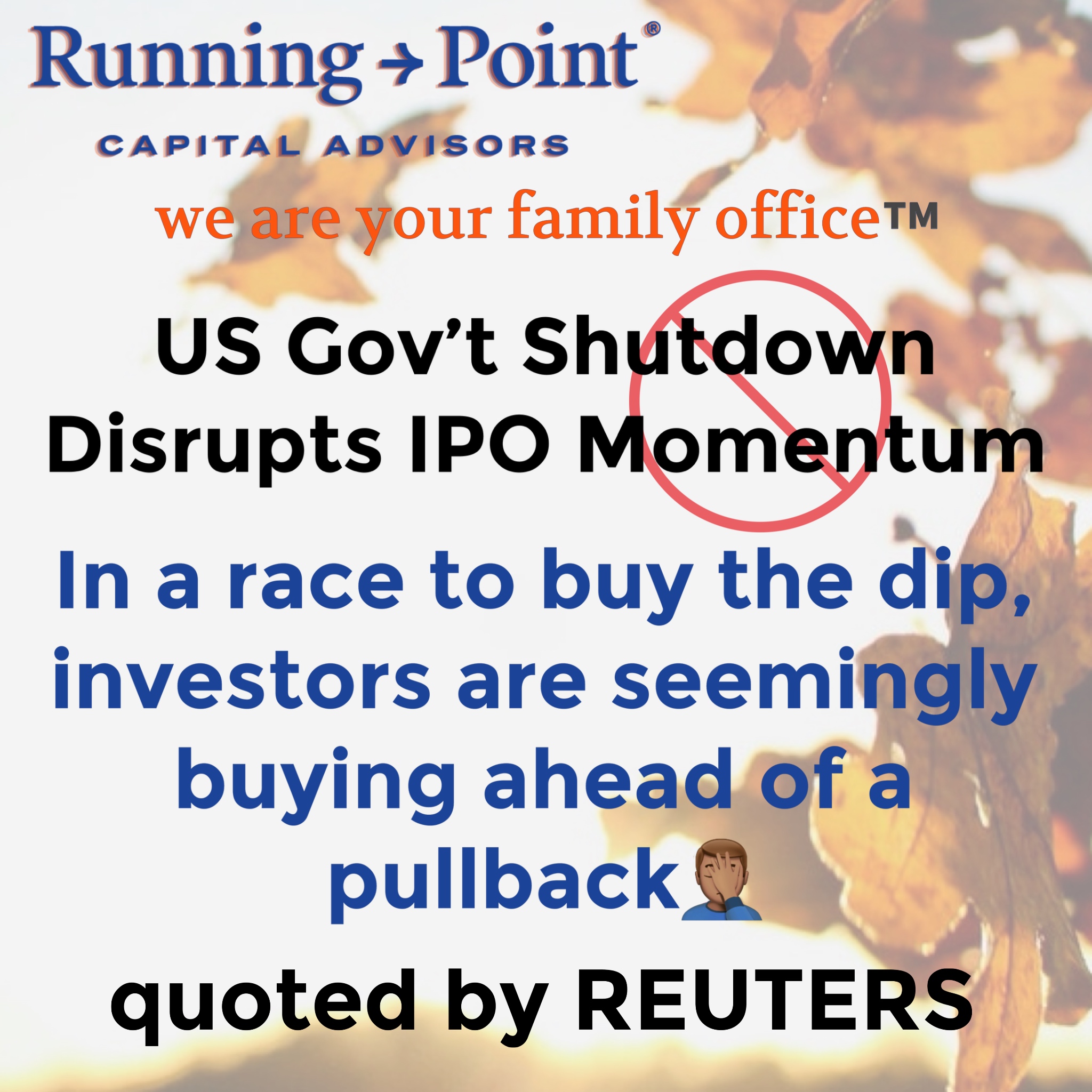What to know about emerging market ETFs
Running Point and its chief investment officer, Michael Ashley Schulman, CFA were quoted by U.S. News & World Report in an article — by reporter Tony Dong, “7 Best Emerging Market ETFs” — regarding the efficient and effective use of emerging market ETFs (exchange traded funds).
Attracting capital
One of the most pressing matters for emerging markets to tackle is the attraction of more capital market investment and more foreign direct investment (FDI). An emerging market government that makes itself highly attractive to foreign investment probably will be attractive to increased domestic investment and development and will see faster job and economic growth. Countries become attractive to FDI when they offer political stability, favorable economic policies, tax breaks, developed infrastructure, a skilled workforce, a sizable and accessible market, a clear legal framework, participation in trade agreements, abundant natural resources, a high quality of life, technological readiness, low corruption levels, and a commitment to environmental and social responsibility. This combination of factors provides a conducive environment for investors, instilling confidence in the stability, profitability, and favorable conduct of business operations within the state.
Developed markets versus emerging markets
Developed markets are expected to see notably slower growth in 2024 as the lagged impact of interest rate hikes ripples through the economy. This begs the question, to what degree will deceleration in advanced nations spill over into emerging markets (EM)? Though some pullback is anticipated, several factors should buffer EM economies including stimulative policies in China, stabilized commodity prices eliminating cost pressures, and relatively sound underlying fundamentals that limit risks of destabilizing currency flights. With policymakers’ backing, steady resources income, and absence of major imbalances, emerging markets seem equipped to navigate the global growth downshift ahead, even if momentum slows from recent years’ breakneck pace.
The risks to this outlook mainly stem from global macro concerns regarding oil price stability—although so far, oil has remained relatively stable during the ongoing wars in the Middle East and Ukraine—and weather related agricultural issues that seem to grow more extreme with climate change.
Country and sector focus
A strong focus on fintech and artificial intelligence (AI) solutions in emerging markets and especially in fast growing regions like Nigeria, Indonesia, and Brazil could help dynamic countries play catch up with more developed nations. Some EM ETFs can even offer exposure to a broad variety of developing countries while excluding government owned enterprises or specific countries like China.
Quoted article excerpts are below:
The main benefit of investing in emerging markets is the potential for less correlated returns that can buoy a portfolio when U.S. or developed markets are lagging, along with favorable demographic tailwinds that could lead to higher-than-average future growth.
“A growing global middle-class population within emerging market countries could fuel economic expansion at a multiple of general global GDP growth as long as there is enough support,” says Michael Ashley Schulman, partner and chief investment officer at Running Point Capital Advisors.
“For most people, emerging market ETFs present an easy, diversified, low-transaction-cost and low-friction path to invest in emerging market countries using their brokerage account or with the help of a financial advisor,” Schulman says.
“When it comes to selecting emerging market ETFs, you should consider whether you want broad exposure to multiple developing economies around the globe, a particular region like Eastern Europe, Latin America or Asia, or a focus on a specific country like China, India or Brazil,” Schulman says.

When you consider the sheer magnitude of investable equities to choose from in the world’s emerging markets, you realize that finding one that looks attractive enough to warrant investing your faith and assets in is as formidable a task as finding a needle in a haystack. Fortunately, researching investment opportunities is a lot more interesting than digging for needles in haystacks.
Mark Mobius, emerging markets fund manager
Disclosure: The opinions expressed are those of Running Point Capital Advisors, LLC (Running Point) and are subject to change without notice. The opinions referenced are as of the date of publication, may be modified due to changes in the market or economic conditions, and may not necessarily come to pass. Past performance is not indicative of future results. Forward-looking statements cannot be guaranteed. Running Point is an investment adviser registered with the U.S. Securities and Exchange Commission. Registration does not imply a certain level of skill or training. More information about Running Point’s investment advisory services and fees can be found in its Form ADV Part 2, which is available upon request. RP-24-08


